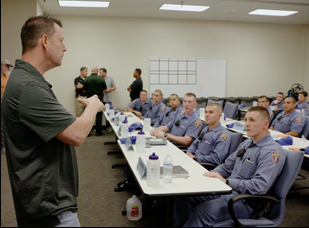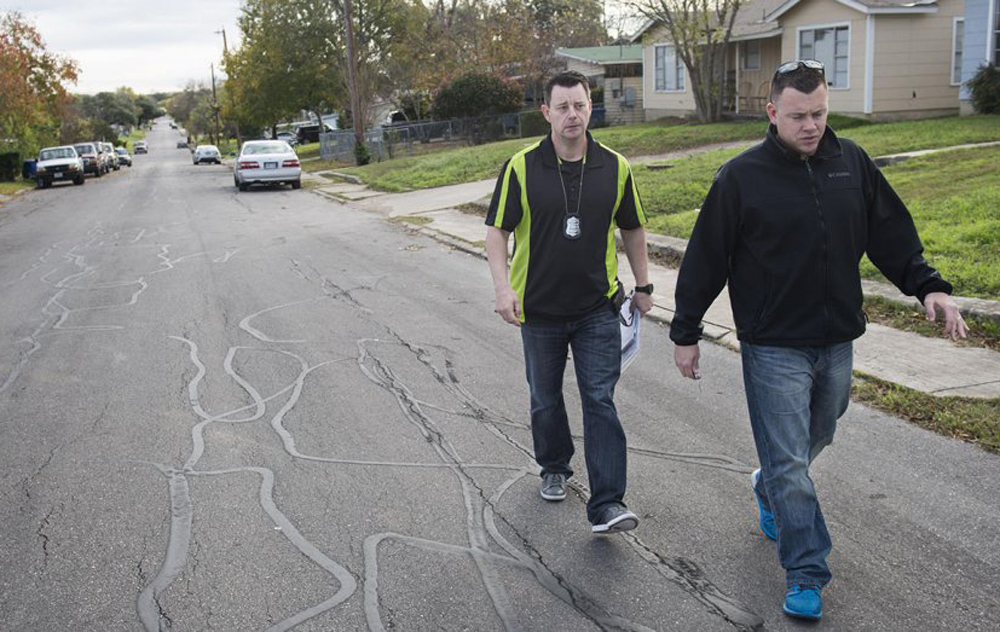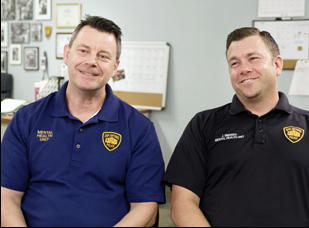It’s likely as unusual a sight for the officers in the room as it is for audiences when during a scene of police training in “Ernie and Joe: Crisis Cops,” Officer Joe Smarro asks his fellow black-and-blue, “Anyone here ever say ‘I’m scared on the job’?”
Few dare raise their hand, and Smarro knows the question he’s asking is largely rhetorical amongst a group that has been instructed to show fear is to demonstrate weakness, but it’s the start of a nuanced conversation that one rarely associates with law enforcement that the officer and his partner Ernie Stevens have been opening up in a far larger way, and now amplified even more with Jenifer McShane’s illuminating film documenting their compassionate work within the San Antonio Police Department. The two cops may put on the uniform occasionally when they have to work overtime, but they they can usually be seen answering calls in plain clothes, dispatched to situations that involve the mentally ill where casual conversation is far more effective at keeping a lid on things than anything else at their disposal.
Stevens, a 22-year veteran of the force who helped pioneer the special unit within the department, found a perfect partner in Smarro, a former Marine whose experience with PTSD following his tour of duty informs his sensitive approach to deescalating dangerous situations, and “Ernie and Joe” follows the duo as they actively disarm the people they encounter on the job and other officers who begin to buy into their techniques by showing how powerful listening and talking things out can be, even in the most precarious moments. For as many tense scenes as McShane is there to witness, most remarkably with a young woman named Kendra, who threatens to throw herself off a bridge when seeing no other way out of her addiction to drugs, she also bears witness to extraordinary moments of grace under pressure, both from the officers and those who are willing to accept help when it appears they haven’t been offered all that much of it before.
When Stevens and Smarro’s mission has come to include teaching their approach to other police departments across the country, the film is bound to spread empathy when it premieres this week in HBO after premiering earlier this year at SXSW where it won a Special Jury Prize and recently, McShane, Stevens and Smarro spoke about handling such subject matter with care and consideration.
Jenifer McShane: Based on my last film [“Mothers of Bedford”], which was about women in prison, I became aware of the appalling connection between people with mental health issues and people who were in prison and how it’s often an intersection of the two, so when I learned about the work happening in San Antonio, it really spoke to me. So I went out to meet [Ernie and Joe] and drive around and just observe without a camera and I was really convinced that I had to tell this story.
What was that period like of getting to know each other without the cameras on?
Joe Smarro: It was a very important part of the process because, especially from a law enforcement mind, I think there’s some inherent trust issues of what’s the process? What are they trying to do and is there [going to be] some “gotcha“ or negative spin on this? But once we met Jen and she spent some time with us, we were quickly able to put that to rest. We knew that we could trust her and she wasn’t going to do anything to make us look more ridiculous than we are. [laughs]
Jenifer McShane: I would tell anybody in my shoes, one of the more important things you do is just show up as a human being and spend time and observe and see what if you think the story is what it actually is and have them get a sense of who I am as a person and vice versa.
Because the program is relatively in its infancy, was it easier or harder to access this situation?
Jenifer McShane: They actually have been doing it for a while now and it is growing. They are a national model and that’s why I wanted to film it in San Antonio because they’re doing it better than most places, so I felt like they’re still growing and changing and working out the kinks, they’ve evolved their program quite a bit. People don’t always realize that innovative things are happening in Texas, and I’m saying that from that kind of east coast/west coast [perspective] where people make assumptions about Texas and how we all make assumptions about each other.
One of the striking elements of the story is that Ernie and Joe spend their days in the mental health unit, but will often do overtime doing more traditional police work. Was it fascinating to witness a shift in demeanor, if there was any?
Jenifer McShane: Oh definitely. Everything about how they approach a call [as part of the mental health unit] is really based on deescalation [of any given situation]. And I went on so many calls with them and every single one of them, it’s “Hello, I’m Ernie.” “Hello, I’m Joe. How can we help you? You’re not in trouble,” showing up in plain clothes and an unmarked car. So already, they’ve reduced the temperature just by those first few moments and it’s important for us to see that good interactions can happen.
Ernie Stevens: When I put the uniform on [for traditional police work], it’s not so much that it changes my approach to how I deal with a situation, but I know going into the situation, I’m going to be viewed differently because right away my presence in uniform is really the first show of force. You can’t even get a cup of coffee or sit down in uniform without people looking over at you and it’s different because when I’m working in mental health without a uniform on, nobody knows I’m a policeman. I’m just able to blend in with everybody else. So it’s not that it changes my approach. It’s just how I feel I’m being viewed.
And it works both ways in a community because a policeman may look at somebody that drives by and right away, it’s like, “Why is that officer staring at me? Do I have my seat belt on? Is my registration expired?” There’s always that back-and-forth tug-of-war that seems to go on in a community and law enforcement and what we’re trying to do is break down those barriers and connect those communities and let them all know, ”Hey, we’re all in this together and we’re going to do our best as law enforcement to provide you the resources and dignity that you deserve when you call for help.“

Jenifer McShane: We had the footage from the dash cam first and then the city of San Antonio requested that it be requested by Kendra and not me, which I actually think is a great idea. So they gave the footage to her and she allowed me to use it. Once I made that connection with her, she agreed to participate and let us do follow-up calls with her, so that was a very important piece of the whole story.
Is the way that Ernie and Joe do followups with her usual procedure?
Ernie Stevens: Well, Kendra, I talked to her last week. She is actually doing pretty good. She’s working as a server right now in a restaurant about 50 yards from where she was standing on the bridge that night, which thought that was very interesting. But because my role has changed a little bit from when the film [was made], a lot of my responsibility is a lot of follow-up with the people that we help. In fact, I’m trying to do preventive care before the crisis even comes in. I’m meeting with people that I know have been hospitalized before for mental health, offering services to them in the field and delivering medications. Our paramedics are giving injections in the homes now. We provide transportation. So we’ve come a long way in a very short time since the film, and a lot of the job now is spent doing follow-up with people that we’ve helped in the past.
Does seeing the film give you any perspective you may not have had before, seeing it from the outside?
Joe Smarro: Yeah, it really validates what we’re doing, honestly, because I think the proof is in people’s responses and whether it’s been law enforcement, fire, treatment providers, community members or actually individuals that have been diagnosed with a mental illness. All of them have responded in kind, so there’s no doubt that we are doing the right thing. It’s like we tell officers, we all joined this profession with the hopes of giving back and serving our communities and helping people. I’ve never experienced any other level of reward since I’ve been on the mental health unit because I truly feel like we get to impact people’s lives and maybe even redirect them onto a positive course. So we knew the work we did was good, but now seeing people respond all over the country in the way they have really does validate our efforts.
For Jenifer, does anything happen over the course of shooting that changes your ideas of what this could be?
Jenifer McShane: When I started making the film, I didn’t realize that we were going to be delving into the mental health of the officers as much as we do. I was aware obviously of Joe’s situation and wanted to cover that, but the [greater] idea of officer suicide and the fact that this is an epidemic across the country, that became more clear to me as I was making the film.
Joe, were you immediately open to sharing your personal bout with PTSD as you do?
Joe Smarro: Absolutely. For me, it all came together at the same time because I applied to do the TED Talk, which is [in] the film, but I thought about doing one for a couple years. I knew what the topic was going to be because I realized several years back going to extensive therapy about the power of human spirit and what is possible when you’re willing to look beyond somebody’s representative self and the benefits of seeing people beyond what they’re wanting you to see. So when Jen was wanting to capture that piece for me, it was a no brainer. But again, it was very, very personal and I didn’t know how it was going to fit in or what it was going to look like, which speaks volumes about what [Jen] and her team were able to do with it because it really, really makes sense from a personal journey standpoint, but also in providing hope for other people who are on the outside looking in
.
I imagine these have been some pretty powerful screenings you’ve had, going on the road with it. What’s it been like to travel with since SXSW?
Jenifer McShane: Yeah, the Q & As have been very emotional. A lot of sharing of personal stories. We had something in L.A. [recently] and people were talking for two hours after the film ended, so it’s really been very rewarding how people have been connecting.
Joe Smarro: That’s been my favorite part, honestly. We get to experience cities that we may not have otherwise. We started in Austin and went to Boston and D.C., Traverse City, Hot Springs, Aspen, Port Townsend, Los Angeles, New York – that’s just us and Jen’s done some other ones and what I love is whether you’re East coast, West coast, North or South, or the Midwest, the responses really have been universally the same. They’re really, really positive and the greatest reward is in seeing how people are responding to this regardless of their geographical proximity in the country.
Ernie Stevens: It has been extremely special for me because I was on this journey of mental health before we had a mental health unit. I was on the department for 12 years before I attended the very first [mental health] training in San Antonio, and I knew right then and there during that class based on a family member coming in and talking about her experiences and her fear of calling the police that this was something I wanted to do to change the community’s mindset. I didn’t want them to fear calling the police for mental health assistance. I wanted them to know that we were making strides and doing our best to provide the help that you need.
So this film captures what we do today, but it brings back memories for me of all the times I attended meetings and joined the National Alliance on Mental Illness and became a board member and going to Austin and trying to lobby for new laws for the mentally ill [ at the State Capitol in Texas]. It just validated all those years of [hearing] people saying, “No” or “That’s good enough,” to see this through. When I see the film, I think wow, in 2008, it was just me and one other officer, and then look at it today. Jen came in and captured value in what I worked so hard at trying to put together and it’s just very, very fulfilling for me.
“Ernie and Joe: Crisis Cops” is now open in New York at the Village East and Los Angeles at the Monica Film Center. It will premiere on HBO on November 19th.





